Welcome to Moda Fabrics!
One hour versus fourteen...
One hour versus fourteen...
That's how much time was saved with the invention of the sewing machine - folks could sew in one hour what used to take them over fourteen hours to do by hand.
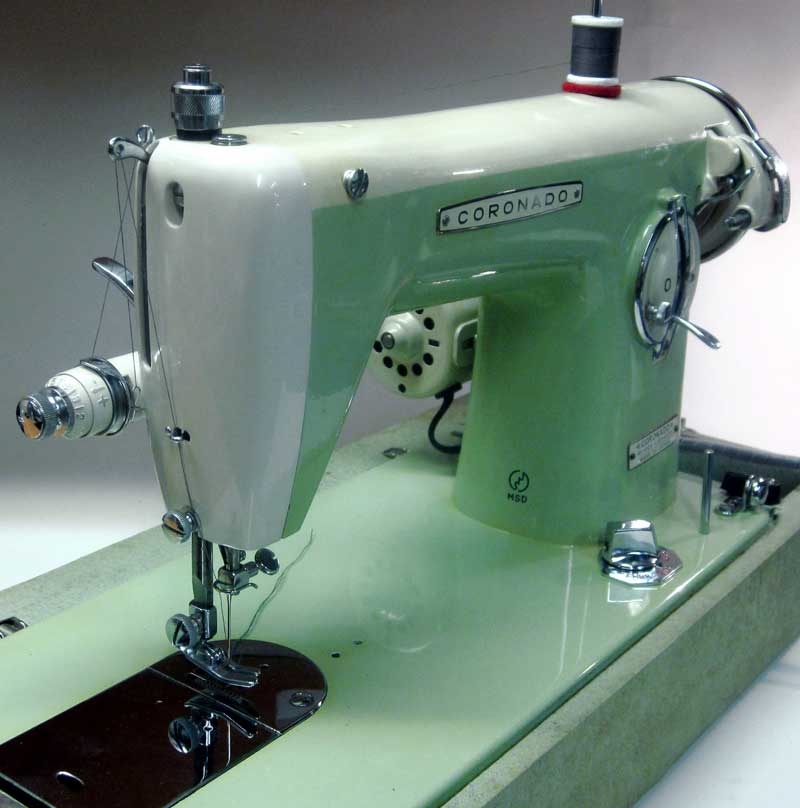
This is a vintage Coronado sewing machine from the 1950s. It was made in Japan and is related to Brother sewing machines.
Today - June 13th - is National Sewing Machine Day!
Can you imagine life without yours? Even the devoted "I love to piece, appliqué and quilt by hand" folks have at least one sewing machine.
Some interesting sewing machine facts:
- The first patent for a sewing machine was granted to Thomas Saint in England in 1790.
- The first sewing machine that used a needle with an eye in the point was invented in 1807 by William and Edward Chapman.
- In France, Bartheleémy Thimmonier's patented a machine in 1830 that literally caused a riot. A French tailor, Thimmonier developed a machine that stitched fabric together by chain stitching with a curved needle. His factory produced uniforms for the French Army and had 80 machines at work by 1841. A mob of tailors displaced by the factory rioted, destroyed the machines, and nearly killed Thimmonier.
- In 1834, Walter Hunt built the first machine that used an eye-pointed needle and created a locked stitch with a second thread from underneath. His invention was never patented.
- English inventor John Fisher combined the various inventions and built the first modern sewing machine in 1844 but due to a botched filing with the Patent Office, he doesn't get credit for the invention.
- Elias Howe gets credit for inventing the first American sewing machine in 1845 - his machine used a needle threaded at the point, a shuttle to form a lock stitch and an automatic feed.
- Issac Merritt Singer? His machine was patented in 1851 and the design featured an overhanging arm that positioned the needle over a flat table so the cloth could be worked under the bar in any direction. It is that design that we use today.
By 1863, the Singer Manufacturing Company was selling 20,000 sewing machines a year for home use. The machines stitched 250 stitches a minute... and not with electricity. The first electric machines weren't invented until 1899.
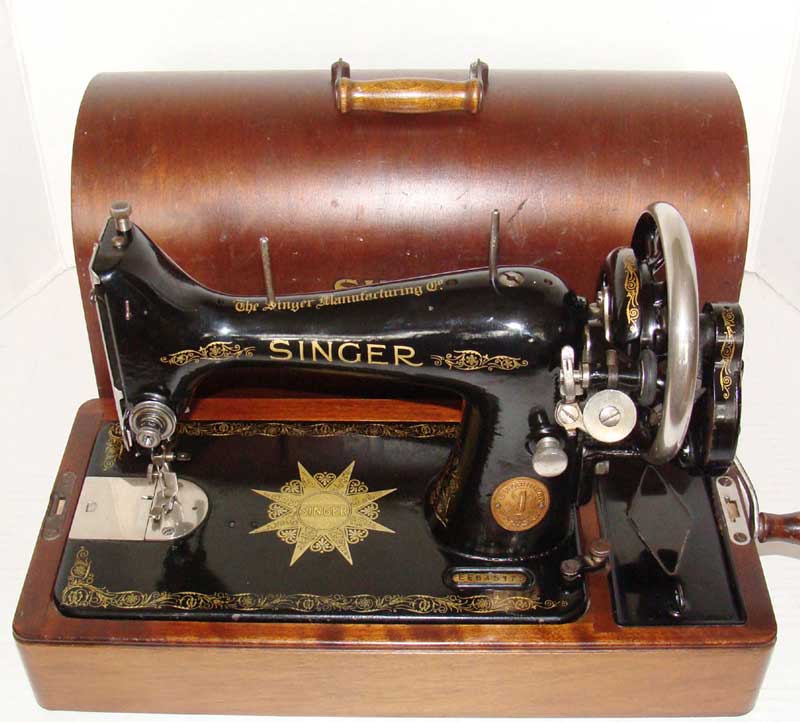
This Singer hand-crank is very old... and I'm sure most of the Moda fabric designers would love to have one just like it, even if it was just to look pretty in their sewing room.
As for what they actually sew with...
- Debbie Maddy sews on a Bernina 1230 that is about 25 years old - she got it as a birthday present when she was 2. (Debbie's birthday was yesterday, June 12! Happy Birthday Debbie!)
- Amy Ellis does most of her sewing on a Baby Lock Destiny II, though she owns six machines including a longarm.
- Camille Roskelley has Berninas and a Featherweight or two, but her main sewing squeeze these days is a Juki.
- Lisa Bongean of Primitive Gatherings has Jukis and Berninas - but she wouldn't confirm that she still has the Bernina Nick bought her when he was trying to convince her to marry him.
- Janet Clare has two Pfaffs and two Singers.
- Corey Yoder makes her beautiful quilts on a Juki and a Bernina.
- Natalia Bonner does all of her sewing on a Bernina 4500QE. She does all of her amazing machine quilting on a Gammill longarm. The Janome Hello Kitty machine? That's for fun.
- Laurie Simpson has two Featherweights that she cannot give up even the motors are slowing down but she sews on a Juki TL2010Q and she loves it. She describes it as a Featherweight on steroids - no bells or whistles, just super-reliable and very fast.
- Betsy Chutchian - a Pfaff Classic Style Quilt at home and a Janome Platinum for teaching. She also has a Singer treadle machine and a Featherweight from the 1940s.
- Jane Davidson of Franny & Jane - a Bernina 710 and a smaller Bernina 215 to take to classes.
- Pat Sloan loves her Baby Lock Destiny II and that's all she'd own up to...
- Barbara Groves' every day machine is a Pfaff Varimatic 6091, but she also owns a Juki, a Janome and 2 Singers.
- Crystal Manning recently upgraded to a Janome Memory Craft 8200 QCP and gave her "old machine" to her sister - it was a Brother CS6000i she bought two years ago as a beginning sewist.
- Chelsi Stratton sews on a Janome that her Mom - Sherri McConnell - bought for her. (Though she's hoping to add a new machine soon.)
- Sherri McConnell loves her Janome Memory Craft 6600P.
- Shannon Gillman Orr - a Janome MC8200 QCP is her go-to machine but she also has a 1950 Singer in Baby Blue and a Janome serger.
- Lynne Hagmeier of Kansas Troubles - four Berninas. Her "newest" machine is over ten years old so she says an upgrade is in her future.
- Kathy Schmitz sews on a Bernina that she describes as "a petite thing... but a workhorse."
- Anne Sutton of Bunny Hill Designs owns two Bernina 440s because she wants to make sure she'll always have one, and a Pfaff 2140 that she loves.
- Joanna Figueroa of Fig Tree & Co. - a classic Bernina 1230 that she will never give up or trade in. She also has a Janome GemGold for traveling and teaching, and a little Featherweight that she uses mostly for photography.
- Jen Kingwell does own sewing machines! She has two Berninas but she might be getting a third as she's not in love with the second one... stay tuned.
- Kristyne Czepuryk sews on a 13-year old Pfaff Quilt Expression - and suddenly she was Wonder Woman, able to make things with ease with her workhorse machine!
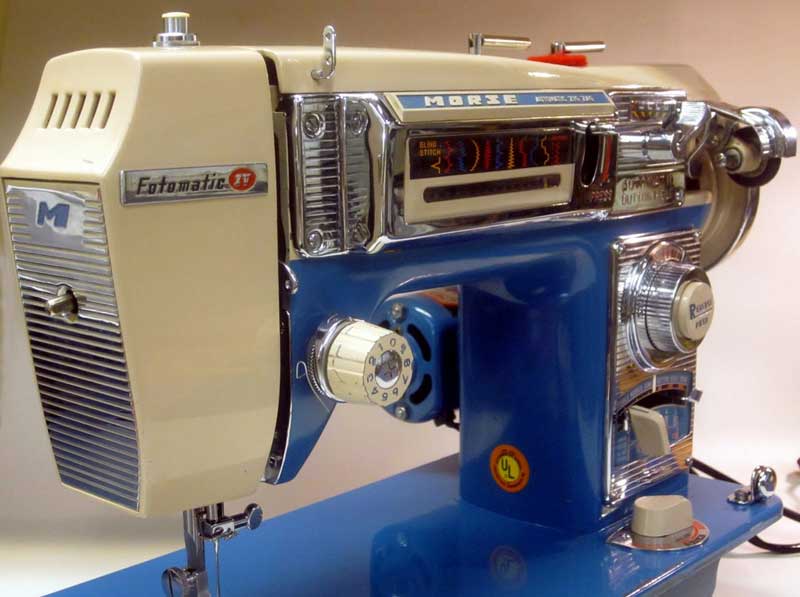
This is a Morse Fotomatic circa 1967.
While the images of vintage machines were initially found on Google and Pinterest, a little sleuthing led me to the origin of the Coronado and Morse machines, a terrific blog-website devoted to vintage machines that sew - MI Vintage Sewing Machines.
I read somewhere that you should give your sewing machine a name so she will know you love her. I love my sewing machines but alas, they do not have names. Is that wrong? Have you named your sewing machine?
One last thing to share on National Sewing Machine Day... while in a thrift shop years ago, a stack of cards with drawings of birds caught my attention. My Aunt Doris was a serious "birder" so I thought they'd be something fun to share with her. I was surprised to see that they were trading cards from the Singer Sewing Machine company dating to the 1920s.
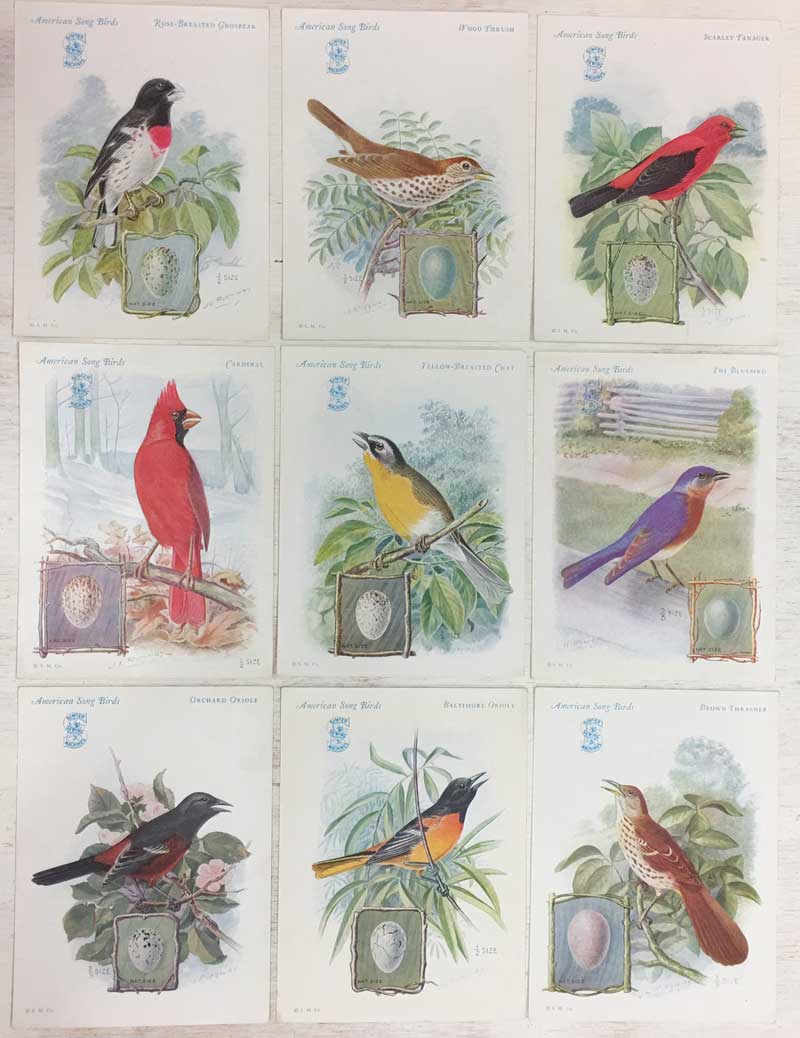
At $1.00 each, I bought them all.
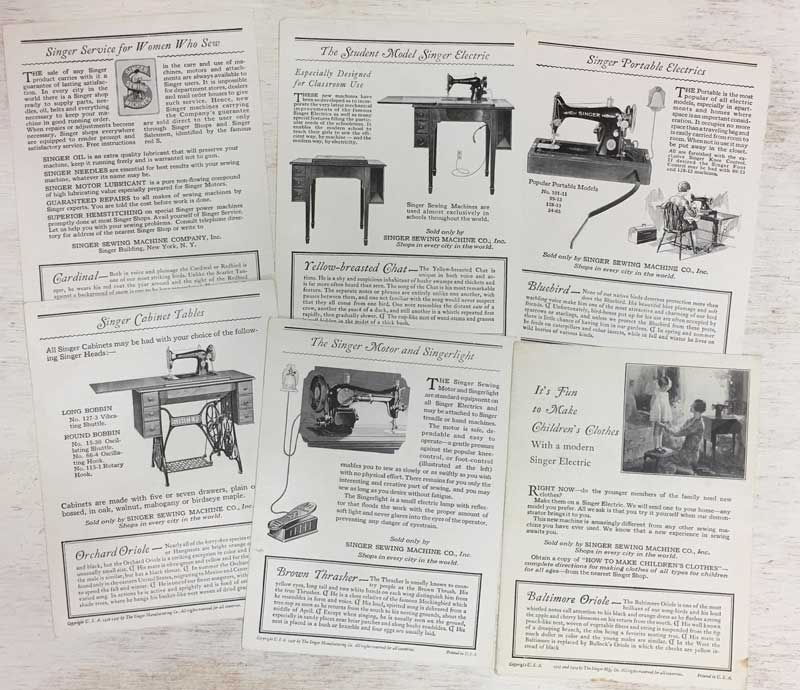
The back of the trading cards includes advertising and everything you might want to know about the Yellow-breasted Chat.
Happy Tuesday - and Happy National Sewing Machine Day!
To celebrate the occasion, I hope you get to spend some quality time with your machine.

Comments